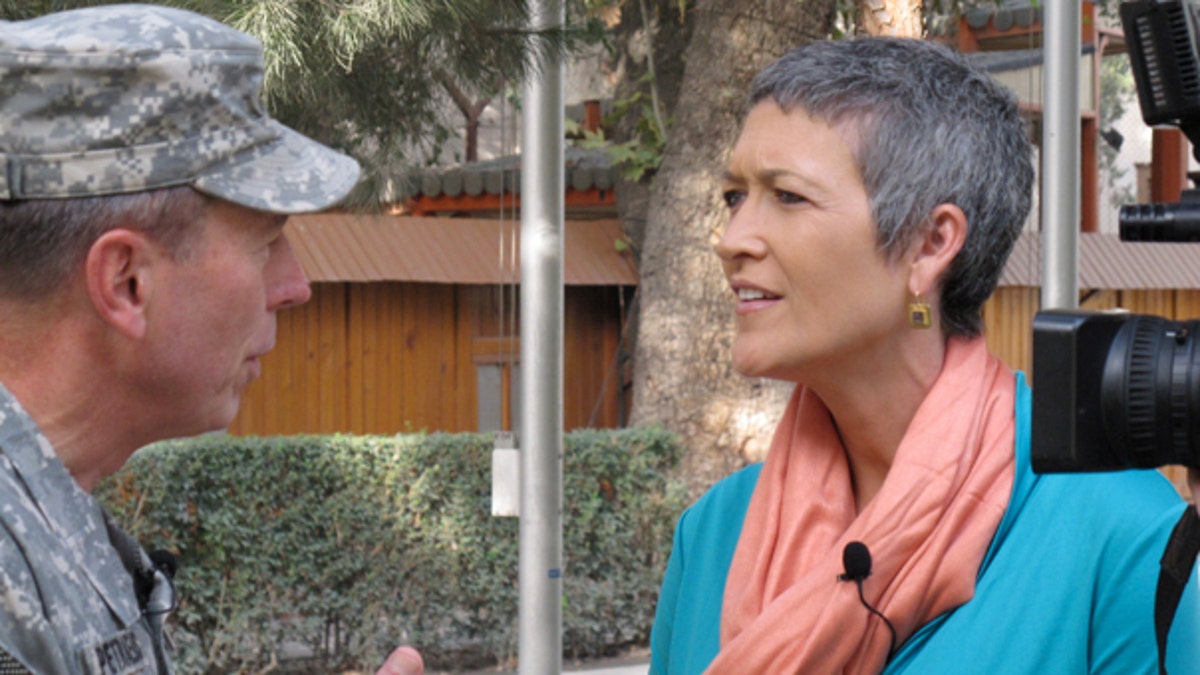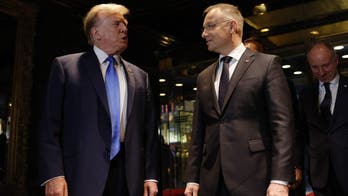
Fox News National Security Correspondent Jennifer Griffin interviews Gen. David Petraeus on the current status of US troops in Afghanistan. (Fox News)
Reconciliation with the Taliban will ultimately be a goal for Afghanistan once U.S. and Afghan forces create conditions to allow it, Gen. David Petraeus said Wednesday.
Speaking in Afghanistan to Fox News' Jennifer Griffin -- in her first overseas assignment since recovering from breast cancer -- Petraeus said that orders approved by provincial governors and local leaders Wednesday enable implementation of measures ordered by Afghan President Hamid Karzai to reintegrate the "$10-a-day Taliban" into society.
Petraeus, the top U.S. commander in Afghanistan, said those low-budget fighters are the first to return to society's fold since they are "local individuals, almost chameleon-like sometimes, in their allegiances because that's how they stay alive over 30 years of war here in this country."
Watch Fox News’ Jennifer Griffin’s interview with Gen. David Petraeus tonight on Special Report at 6 p.m. ET.
Petraeus described how in the last two days, small groups of individuals and lower-level leaders came in, "laid down their weapons and, in one case, were given reintegration certificates by the governor of the province."
As a result, the prospect of large-scale reintegration "is very real," Petraeus said.
The military chief's comment is the first from a U.S. commander offering a firm endorsement for the reintegration approach that has been reported by leaks in recent months.
Other commanders have been more cagey about openly supporting such talks with the Taliban, but Petraeus acknowledged that U.S. forces safeguard the movement of officials to those meetings with the Taliban officials.
He said reconciliation is a broader matter than reintegration because it takes place at higher levels. Karzai has offered a list of conditions Taliban fighters must meet to be a part of Afghanistan's future -- accept the constitution, lay down weapons, cut ties to Al Qaeda and become productive or participating members of society.
If those "redlines" are met, Petraeus said he doesn't see "why you would not support reconciliation."
"We sat down across the table in Iraq from individuals who had our blood on their hands. That's what was done in northern Ireland. It's what's done in just about any insurgency as you get to the end stages of it," he said.
"If there's a willingness of those at the high-levels to do that, and they do indeed agree to the safeguards. ... then certainly you would want to reconcile," he said.
Petraeus added that the U.S. is not facilitating those meetings, but "is very much in the information loop and in a couple of cases has helped in a sense, but is not doing the negotiation."
But getting the Taliban to the point where they are ready to give up fighting is the tricky part. This week, several dozen schoolgirls and some of their teachers were poisoned. Petraeus noted that the Taliban have tried that tactic in other locations -- schools and police forces -- along with other barbarities like stoning, flogging and killing of medical teams -- an indication they are not ready to retreat.
To that end, he has been refining the tactical directives given to U.S. forces by lower-level commanders. Petraeus described the rules of engagement as "fundamentally sound" but said in practice some officers had been adding further restrictions to the plan created by his predecessor Gen. Stanley McChrystal, which he fully supported.
The recent changes -- implemented just in the past weeks -- along with a full complement of 100,000 U.S. troops, additional civilian forces and funding for 100,000 Afghan troops -- have enabled enactment of a strategy that has been in development for 18 months.
That strategy is seeing progress in Helmand Province, where Marines are fighting in Marja and unlikely to be done by July 2011, the self-imposed U.S. deadline for a drawdown.
The Taliban would "really like (to) recapture that very important command-and-control mode and narcotics industry nexus," Petraeus said.
But the fact is, Petraeus said, in this past week, Marjans were able to register to vote and are now opening shops. One third of the 30,000-strong population has returned from hiding since six months ago, when the streets in Marja were controlled by Taliban.
In Kandahar, the U.S. has started "clear, hold and build operations," while Kabul City's security perimeter is expanding, and is being led by Afghan forces.
"Kabul City itself is one-sixth of the population in the entire country. So again that's a pretty significant task. And they're generally doing quite a good job," Petraeus said.
Critics had called the timetable for a July 2011 a forecast to Taliban fighters that they merely need to hang on for a while longer and the U.S. will leave. But Petraeus said the deadline was designed to send a message of urgency to the Afghans and is not a date at which the U.S. will turn out the lights and go home.
Petraeus said he understands the impatience at home, but the core objective and the vital U.S. national security interest is "not to see Afghanistan once again become a sanctuary for transnational extremists the way it was prior to the 9/11 attacks."
"And the only way to do that that any of us can fathom is by doing what it is that we are attempting to do. And that is to carry out a comprehensive civil military counterinsurgency campaign," he said.
Petraeus, who called the WikiLeaks scandal -- in which a website published nearly 100,000 pages of classified U.S. military documents -- "absolutely reprehensible," said he's not aware of any lives lost as a result of the documents, but it remains a concern.
Those documents published by WikiLeaks offered details about Iranian efforts to undermine the U.S. war in Afghanistan and fund the insurgency. Petraeus said he thinks Iran does "provide a modicum of assistance to the Taliban, but not an enormous amount," and certainly not as much as it did in Iraq.
"They don't love the Taliban either," he said.
Nonetheless, Petraeus said he sees credibility in assessments that Iran is seeking to influence the upcoming parliamentary elections, though no weapons caches from Iran have been found in Taliban hands recently nor has there been evidence that violence in the north is inspired by Iranian support.




